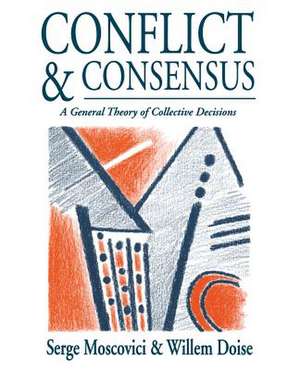Conflict and Consensus: A General Theory of Collective Decisions
Autor Serge Moscovici, Willem Doiseen Limba Engleză Paperback – 3 aug 1994
Preț: 487.43 lei
Nou
Puncte Express: 731
Preț estimativ în valută:
93.27€ • 97.38$ • 77.19£
93.27€ • 97.38$ • 77.19£
Carte tipărită la comandă
Livrare economică 04-18 aprilie
Preluare comenzi: 021 569.72.76
Specificații
ISBN-13: 9780803984578
ISBN-10: 080398457X
Pagini: 224
Dimensiuni: 156 x 234 x 16 mm
Greutate: 0.41 kg
Ediția:1
Editura: SAGE Publications
Colecția Sage Publications Ltd
Locul publicării:London, United Kingdom
ISBN-10: 080398457X
Pagini: 224
Dimensiuni: 156 x 234 x 16 mm
Greutate: 0.41 kg
Ediția:1
Editura: SAGE Publications
Colecția Sage Publications Ltd
Locul publicării:London, United Kingdom
Recenzii
`Useful to those interested in group dynamics, the book discusses topics such as groups' functions, decision making, group conflict and consensus and the role of values in that process, and communication' - Choice
`A complex and sophisticated argument is fully and clearly detailed by the authors. From a dispute resolution point of view, their analysis and conclusions are important as they address some of the basic concerns that arise in any disputing situation. A careful study of the material offered will be well repaid in one's understanding of, and ability to assist in, the process of consensus development for groups of any substantial size' - The Alternative Newsletter
`Essential reading for social and organizational psychologists, management scholars and anyone working on intergroup relations and conflict issues' - European Foundation for Management Development
`Moscovici and Doise's remarkable monograph supplies the strongest argument possible for revisiting experimental social psychology and to go beyond the intuitively attractive but theoretically insubstantial management literature on groups. They have conducted an exhaustive and masterly review of the research evidence, convincingly and scrupulously demonstrating something quite unusual in the behavioural sciences: a set of reliable empirical truths underpinned by coherent and parsimonious theory... The central theme is... "group polarization", or the tendency for groups to resolve to consensus around more extreme positions than the average positions of their individual members... The authors' thesis is fundamentally social democratic and laden with optimism. In the absence of traditional authority or appeal to scientific truth, consensus in society can only be achieved by open exchange. Conflict and consensus, far from being hostile opposing principles, are part of a constructive dialectic, which can culminate in no less than what they call the "reinvigoration of society"... the book is a classic statement in one of the most important domains of psychology, and has the most far-reaching implications for how we use and misuse groups in organizations' - Personnel Psychology
`A complex and sophisticated argument is fully and clearly detailed by the authors. From a dispute resolution point of view, their analysis and conclusions are important as they address some of the basic concerns that arise in any disputing situation. A careful study of the material offered will be well repaid in one's understanding of, and ability to assist in, the process of consensus development for groups of any substantial size' - The Alternative Newsletter
`Essential reading for social and organizational psychologists, management scholars and anyone working on intergroup relations and conflict issues' - European Foundation for Management Development
`Moscovici and Doise's remarkable monograph supplies the strongest argument possible for revisiting experimental social psychology and to go beyond the intuitively attractive but theoretically insubstantial management literature on groups. They have conducted an exhaustive and masterly review of the research evidence, convincingly and scrupulously demonstrating something quite unusual in the behavioural sciences: a set of reliable empirical truths underpinned by coherent and parsimonious theory... The central theme is... "group polarization", or the tendency for groups to resolve to consensus around more extreme positions than the average positions of their individual members... The authors' thesis is fundamentally social democratic and laden with optimism. In the absence of traditional authority or appeal to scientific truth, consensus in society can only be achieved by open exchange. Conflict and consensus, far from being hostile opposing principles, are part of a constructive dialectic, which can culminate in no less than what they call the "reinvigoration of society"... the book is a classic statement in one of the most important domains of psychology, and has the most far-reaching implications for how we use and misuse groups in organizations' - Personnel Psychology
Cuprins
Introduction
The Problem
What Use Are Groups?
The Elementary Forms of Participation in Decisions and Consensus
Extreme Conflicts and Consensuses
The Effects of Private or Public Discussions
Conflicts and Extreme Consensuses
The Role of Values
`Warm and Cold' Communications
Consensus in Closed and Open Groups
Decision-Making
The Problem
What Use Are Groups?
The Elementary Forms of Participation in Decisions and Consensus
Extreme Conflicts and Consensuses
The Effects of Private or Public Discussions
Conflicts and Extreme Consensuses
The Role of Values
`Warm and Cold' Communications
Consensus in Closed and Open Groups
Decision-Making
Descriere
This book presents a bold new theory of the processes of collective decision-making that draws on theoretical influences ranging from group decision theory through to the authors' own social representations theory. Moscovici and Doise offer a novel analysis of group conflict and the construction of consensus to produce a general theory of collective decisions.
Going beyond the traditional view that compromise is a negative process where group members merely comply in order to sustain cohesion, the authors argue that the conflict at the root of group decisions can be a positive force leading to changes in opinion and to innovation. Their theoretical framework is illustrated in depth with numerous empirical investigations fro













